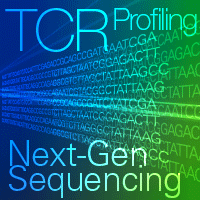T-cell receptor profiling

Cellular immunity is mediated by T cells, which participate directly in the detection and neutralization of pathogenic threats via T-cell receptors (TCRs). Given the relative specificity of TCR-antigen interactions, a high diversity of TCRs are required to recognize a myriad of pathogenic agents. To this end, the adaptive immune system has evolved a mechanism for somatic diversification of TCRs that is unrivaled in all of biology. TCRs are heterodimers composed of two distinct subunit chains, most commonly α and β chains, resulting from somatic rearrangements in a process called V(D)J recombination (Figure 1). An extensive repertoire of T cells with diverse TCR sequences is critical for the immune system to recognize mutated proteins and neoantigens from tumor cells. One challenge of immunogenomics applied to cancer is to determine T cell repertoires and to identify tumor-reactive T-cell clones, before and in response to immunotherapy in cancer patients (Liu et al. 2017).

Figure 1. T-cell receptor structure and diversification. Panel A. A functional αβ TCR heterodimer consisting of α- and β-subunit chains. TCR-α subunit chains are comprised of "variable" (V), "joining" (J), and "constant" (C) segments depicted in magenta, blue, and green, respectively, while TCR-β subunit chains include these and an additional "diversity" (D) segment, depicted in orange. The CDR3 region of the TCR-β subunit is labeled. The TCR is represented on the T-cell surface, bound to an antigen associated with an MHC molecule on the surface of an APC. Panel B. V(D)J recombination and posttranscriptional processing of a TCR-β subunit chain. The TCR-β locus includes over 50 V segments (magenta), 2 D segments (orange), and 13 J segments (blue). During somatic diversification, at least one of each segment type is randomly selected, and further variability is introduced through the incorporation and deletion of additional nucleotides (yellow). Splicing of TCR mRNA combines a subset of the respective segments (along with a constant region) into a continuous unit. TCR-α subunit chains are generated via analogous mechanisms.
Highlighted products
SMARTer immune profiling kits leverage our SMART technology and a 5'-RACE-based approach to capture full-length information from V(D)J variable regions of TCRs. These kits streamline the process of sample preparation, provide reproducible results for a wide range of inputs of mouse/human samples (purified cells, spleen, PBMCs, Jurkat cells, etc.), and are highly sensitive in detecting low-abundance transcripts. SMARTer human/mouse TCR a/b profiling kits are the ideal tools for TCR profiling to gain insights into TCR repertoire diversity from bulk samples (total RNA or purified cells). Since the unique alpha-beta chain pairing of a TCR mediates antigen specificity, obtaining pairing information is crucial to gaining insights into antigen recognition, designing TCRs for targeted immunotherapy, and establishing ancestral relationships of T-cell populations (Wegehaupt et al. 2017).
The SMARTer Human scTCR a/b Profiling Kit enables the full capture of TCR-α and TCR-β variable regions to elucidate TCR α/β pairing information within single T-cells. In addition, the ICELL8 Human TCR a/b Profiling Reagent Kit for can capture complete V(D)J variable regions of TCR transcripts from >1,000 single cells.
References:
Liu, X. S. & Mardis, E. R. Applications of immunogenomics to cancer. Cell 168, 600–612 (2017).
Wegehaupt, A. K. et al. Recovery and assessment of leukocytes from LR Express filters. Biologicals 49, 15–22 (2017).
Featured products

CAR T-cell therapy: the latest weapon in the fight against cancer
Read our blog post examining how CAR T-cell therapies for blood cancers show promise for a safer, targeted, and more effective cancer treatment.
Learn moreTakara Bio USA, Inc.
United States/Canada: +1.800.662.2566 • Asia Pacific: +1.650.919.7300 • Europe: +33.(0)1.3904.6880 • Japan: +81.(0)77.565.6999
FOR RESEARCH USE ONLY. NOT FOR USE IN DIAGNOSTIC PROCEDURES. © 2025 Takara Bio Inc. All Rights Reserved. All trademarks are the property of Takara Bio Inc. or its affiliate(s) in the U.S. and/or other countries or their respective owners. Certain trademarks may not be registered in all jurisdictions. Additional product, intellectual property, and restricted use information is available at takarabio.com.




